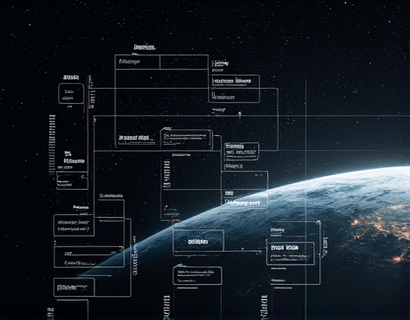Real-Time Government Data: Empowering Citizens and Enhancing Civic Participation Through Open Access and Accountability
In the digital age, the accessibility of real-time government data has emerged as a pivotal factor in transforming the landscape of civic engagement and governance. This shift towards open data initiatives is not merely a technological advancement but a fundamental step towards creating a more transparent, accountable, and participatory democracy. By providing citizens with immediate access to government operations and decisions, real-time data empowers individuals to make informed choices, hold authorities accountable, and actively participate in the democratic process.
The concept of open government data is rooted in the principle that information should be freely available to the public, without restrictions imposed by copyright, patents, or other means of control. This openness is crucial for fostering an environment where citizens can scrutinize government actions, identify inefficiencies, and propose improvements. Real-time data takes this a step further by ensuring that the information is not only accessible but also up-to-date, reflecting the current state of government activities and policies.
Enhancing Transparency and Accountability
Transparency in government is the cornerstone of a healthy democracy. When citizens have real-time access to government data, it becomes easier to track the allocation of public funds, monitor policy implementation, and assess the performance of public officials. This level of transparency reduces the potential for corruption and mismanagement, as government actions are subject to constant scrutiny. Accountability is similarly bolstered, as officials are more likely to act in the public interest when they know their decisions and actions are readily available for review.
Real-time government data platforms serve as a watchdog, enabling citizens to act as informed observers of public affairs. For instance, budget data can be updated in real-time, allowing citizens to see how tax dollars are being spent moment by moment. This immediacy ensures that any discrepancies or irregularities can be identified and addressed promptly, fostering a culture of responsibility and integrity within government institutions.
Fostering Informed Citizen Participation
The availability of real-time data significantly enhances the quality of civic participation. When citizens have access to current and accurate information, they can engage more meaningfully in discussions, debates, and decision-making processes. This informed participation is essential for a vibrant democracy, as it ensures that policies and laws reflect the genuine needs and preferences of the population.
Real-time data can empower citizens to monitor and contribute to public consultations, provide feedback on proposed policies, and participate in community planning initiatives. For example, urban development projects can benefit from real-time input from residents, ensuring that the final plans align with the community's needs and aspirations. This collaborative approach not only improves the quality of governance but also increases public satisfaction and trust in government institutions.
Real-Time Data and Emergency Response
One of the most critical areas where real-time government data shines is in emergency response and management. During natural disasters, public health crises, or other emergencies, timely and accurate information can save lives and resources. Real-time data platforms can provide updates on the status of emergencies, resource availability, and evacuation routes, enabling citizens to make quick and informed decisions.
For instance, during a natural disaster, real-time data can inform citizens about the location of shelters, the availability of medical aid, and the progress of rescue operations. This immediate access to critical information helps reduce panic and confusion, allowing for a more coordinated and effective response. Moreover, real-time data can facilitate the mobilization of volunteers and resources, ensuring that aid reaches those in need as swiftly as possible.
Promoting Economic Development and Innovation
Real-time government data also plays a significant role in economic development and innovation. By making data on infrastructure, regulations, and market conditions readily available, businesses and entrepreneurs can make more informed decisions, leading to increased investment and job creation. This openness to data can attract both domestic and international investors, fostering a dynamic and competitive economy.
For example, real-time traffic data can help urban planners and transportation companies optimize routes and reduce congestion, improving overall efficiency. Similarly, real-time environmental data can assist companies in adhering to regulatory standards and adopting sustainable practices, contributing to a greener economy. These data-driven insights not only enhance economic performance but also promote social and environmental well-being.
Challenges and Considerations
While the benefits of real-time government data are undeniable, there are several challenges that need to be addressed to ensure its successful implementation. One of the primary concerns is data quality and accuracy. Real-time data must be reliable and consistent to be useful. Governments must invest in robust data collection and verification processes to maintain the integrity of the information provided.
Another challenge is ensuring data privacy and security. While transparency is crucial, it must be balanced with the protection of sensitive information. Governments need to implement stringent security measures to prevent unauthorized access and misuse of data. Additionally, clear guidelines and regulations should be established to govern the use and sharing of data, ensuring that citizens' rights are respected.
Case Studies and Success Stories
Several countries and cities have successfully implemented real-time government data initiatives, demonstrating their positive impact on civic engagement and governance. For instance, the city of New York launched NYC OpenData, a comprehensive platform that provides access to a wide range of city data, from crime statistics to budget information. This initiative has empowered citizens to analyze and visualize data, leading to more informed discussions and policy recommendations.
In another example, the UK's Data.gov.uk offers a wealth of government data, fostering innovation and collaboration between the public and private sectors. Developers and researchers can use this data to create applications and services that improve public services and enhance the quality of life for citizens. These success stories highlight the potential of real-time government data to transform governance and civic participation.
Moving Forward: The Path to a More Transparent Governance
As the importance of real-time government data becomes increasingly evident, there is a growing need for widespread adoption and improvement of these initiatives. Governments at all levels should prioritize the development of open data platforms, ensuring that they are user-friendly, accessible, and comprehensive. Collaboration between government agencies, technology experts, and civil society organizations is essential to overcome technical and regulatory challenges.
Citizens, too, play a vital role in this transformation. By actively engaging with real-time data, voicing their concerns, and contributing to public discussions, individuals can help shape a more transparent and accountable government. Educational programs and public awareness campaigns can empower citizens to leverage data for the common good, fostering a culture of informed and active citizenship.
In conclusion, real-time government data is a powerful tool for enhancing civic participation and governance. By providing immediate access to accurate and up-to-date information, it empowers citizens to hold authorities accountable, participate more effectively in democratic processes, and contribute to the betterment of their communities. Embracing this data-driven approach is not just a technological advancement but a step towards a more transparent, inclusive, and responsive democracy.










































